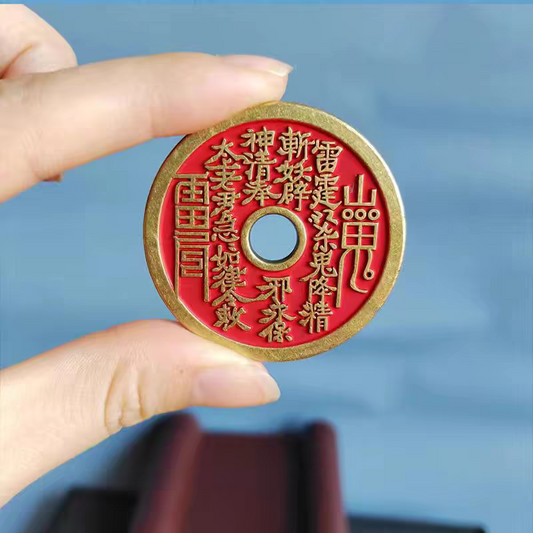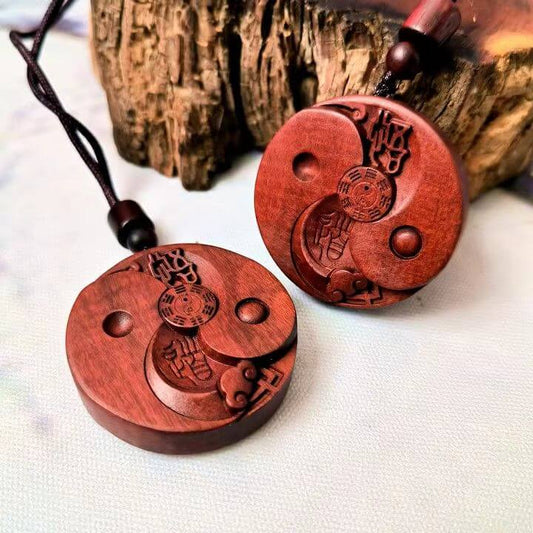
Indelible traces: The Shangqing School actually originated from the Tianshi Daoism
paulpengShare
Regarding the early history of the Shangqing School of Taoism, Tao Hongjing of the Liang Dynasty in the Southern Dynasties recorded it in great detail in his work "Zhen Gao". According to "Zhen Gao", in the second year of Xingning in the Eastern Jin Dynasty, many immortals such as Lady Wei Huacun of Mount Nanyue descended. Lady Wei Huacun bestowed thirty-one volumes of the "Shangqing" scriptures taught by the (Qingxu Zhenren) Wang Bao, as well as biographies of various immortals and miscellaneous matters about cultivation to Yang Xi, the attendant of the duke's mansion of Situ Gong in Langya. Yang Xi received what was passed down by Lady Wei Huacun, wrote it out in clerical script, and passed it on to Xu Mu, the guard army chief historian of Danyang and governor of Gouling. Xu Mu then passed it on to his son Xu Hui.

In the lineage of the transmission of the Shangqing School, Lady Wei Huacun of Mount Nanyue is the founding patriarch, Yang Xi is the second-generation patriarch, and Xu Mu and Xu Hui are the third and fourth-generation patriarchs respectively. It seems that the scriptures and cultivation methods of the Shangqing School were directly taught by immortals, but in fact, there are strong marks of Tianshi Daoism behind the Shangqing School.
There is a detail that later Taoist priests often intentionally or unintentionally ignore. That is, Lady Wei Huacun actually believed in Tianshi Daoism at the beginning. The Wei family of Lady Wei Huacun was an aristocratic family in Luoyang. The spread of Tianshi Daoism in Luoyang, the capital of the Western Jin Dynasty, was related to Zhang Lu, the third-generation celestial master. Zhang Lu ruled Hanzhong for nearly thirty years and governed it with the Taoist organization of Tianshi Daoism. In the chaotic times of the Three Kingdoms, Hanzhong was like a paradise on earth.

However, in the era of the Three Kingdoms, whoever had the stronger fist had the final say. When Cao Cao attacked Hanzhong, Zhang Lu surrendered very sensibly. Cao Cao naturally treated this Taoist leader very favorably, enfeoffing him as the general who pacifies the south, and migrated the entire Tianshi Daoist community to Luoyang. Thus, Tianshi Daoism began to spread in Luoyang, and many great families became aristocratic families who believed in Tianshi Daoism. The most famous of them was the Wang Xizhi family, and the Xu Mu and Xu Hui families in Danyang also believed in Tianshi Daoism for generations. The Wei Huacun family believed in it soon after Tianshi Daoism began to spread in Luoyang.
Lady Wei Huacun's father was named Wei Shu, a founding hero of the Western Jin Dynasty. He succeeded Shan Tao as the minister of Situ. According to Wei Shu himself, when he was young, he heard the gods talking and predicted that he would reach the position of one of the three highest officials. Later, it turned out as he had predicted. Under the influence of Wei Shu, Wei Huacun loved the Tao since childhood and soon became the libationer of Tianshi Daoism. Originally, "libationer" was used to refer to the elder who poured wine and sacrificed to the gods during ancient feasts. Later, "libationer" became an official title and the chief official of the Imperial College, the highest educational institution in the country.

Tianshi Daoism borrowed this term and used "libationer" to refer to those with relatively profound cultivation. According to the regulations of Tianshi Daoism, newly joined believers are called "ghost soldiers", and only after believing in the Tao can they be qualified as "libationers". Lady Wei Huacun had profound Taoist methods and became the libationer of Tianshi Daoism, and also had a certain influence within the sect.
However, Lady Wei Huacun was not satisfied with the cultivation methods of Tianshi Daoism. Therefore, on the basis of the cultivation methods of Tianshi Daoism, she created a new Shangqing cultivation method. The Shangqing cultivation method mainly focuses on concentration, maintaining unity, and circulating qi. By "concentrating" on the various gods within the body and various things outside the body to concentrate the mind, one can achieve inner concentration of the spirit and prevent the spirit from straying. This cultivation method was deeply liked by Taoist believers from the upper class and soon spread. Only then did Xu Mu and Yang Xi create the fact of the Shangqing School by borrowing the descent of immortals.
In fact, Xu Mu and Yang Xi also believed in Tianshi Daoism. The Xu family was also an aristocratic family that believed in Tianshi Daoism and was very familiar with the Taoist methods of Tianshi Daoism. In particular, the family often supported high-level Taoist priests of Tianshi Daoism. There was a Taoist priest named Li Dong of Tianshi Daoism who was the libationer supported by the Xu family, and Yang Xi also took Li Dong as his teacher. "Zhen Gao" clearly records that Li Dong's family is in the east of Qu'e and he is the libationer and the leader of the gods on the left side of Jiyang governance of Tianshi Daoism.
The facts are very clear, so there is no need to deny the blood connection between the Shangqing School and Tianshi Daoism. It is by making innovations on the shoulders of giants that there was the later development of the Shangqing School. Absorption and innovation are precisely the secrets for the continuous development and growth of Taoism later, aren't they?

In the lineage of the transmission of the Shangqing School, Lady Wei Huacun of Mount Nanyue is the founding patriarch, Yang Xi is the second-generation patriarch, and Xu Mu and Xu Hui are the third and fourth-generation patriarchs respectively. It seems that the scriptures and cultivation methods of the Shangqing School were directly taught by immortals, but in fact, there are strong marks of Tianshi Daoism behind the Shangqing School.
There is a detail that later Taoist priests often intentionally or unintentionally ignore. That is, Lady Wei Huacun actually believed in Tianshi Daoism at the beginning. The Wei family of Lady Wei Huacun was an aristocratic family in Luoyang. The spread of Tianshi Daoism in Luoyang, the capital of the Western Jin Dynasty, was related to Zhang Lu, the third-generation celestial master. Zhang Lu ruled Hanzhong for nearly thirty years and governed it with the Taoist organization of Tianshi Daoism. In the chaotic times of the Three Kingdoms, Hanzhong was like a paradise on earth.

However, in the era of the Three Kingdoms, whoever had the stronger fist had the final say. When Cao Cao attacked Hanzhong, Zhang Lu surrendered very sensibly. Cao Cao naturally treated this Taoist leader very favorably, enfeoffing him as the general who pacifies the south, and migrated the entire Tianshi Daoist community to Luoyang. Thus, Tianshi Daoism began to spread in Luoyang, and many great families became aristocratic families who believed in Tianshi Daoism. The most famous of them was the Wang Xizhi family, and the Xu Mu and Xu Hui families in Danyang also believed in Tianshi Daoism for generations. The Wei Huacun family believed in it soon after Tianshi Daoism began to spread in Luoyang.
Lady Wei Huacun's father was named Wei Shu, a founding hero of the Western Jin Dynasty. He succeeded Shan Tao as the minister of Situ. According to Wei Shu himself, when he was young, he heard the gods talking and predicted that he would reach the position of one of the three highest officials. Later, it turned out as he had predicted. Under the influence of Wei Shu, Wei Huacun loved the Tao since childhood and soon became the libationer of Tianshi Daoism. Originally, "libationer" was used to refer to the elder who poured wine and sacrificed to the gods during ancient feasts. Later, "libationer" became an official title and the chief official of the Imperial College, the highest educational institution in the country.

Tianshi Daoism borrowed this term and used "libationer" to refer to those with relatively profound cultivation. According to the regulations of Tianshi Daoism, newly joined believers are called "ghost soldiers", and only after believing in the Tao can they be qualified as "libationers". Lady Wei Huacun had profound Taoist methods and became the libationer of Tianshi Daoism, and also had a certain influence within the sect.
However, Lady Wei Huacun was not satisfied with the cultivation methods of Tianshi Daoism. Therefore, on the basis of the cultivation methods of Tianshi Daoism, she created a new Shangqing cultivation method. The Shangqing cultivation method mainly focuses on concentration, maintaining unity, and circulating qi. By "concentrating" on the various gods within the body and various things outside the body to concentrate the mind, one can achieve inner concentration of the spirit and prevent the spirit from straying. This cultivation method was deeply liked by Taoist believers from the upper class and soon spread. Only then did Xu Mu and Yang Xi create the fact of the Shangqing School by borrowing the descent of immortals.
In fact, Xu Mu and Yang Xi also believed in Tianshi Daoism. The Xu family was also an aristocratic family that believed in Tianshi Daoism and was very familiar with the Taoist methods of Tianshi Daoism. In particular, the family often supported high-level Taoist priests of Tianshi Daoism. There was a Taoist priest named Li Dong of Tianshi Daoism who was the libationer supported by the Xu family, and Yang Xi also took Li Dong as his teacher. "Zhen Gao" clearly records that Li Dong's family is in the east of Qu'e and he is the libationer and the leader of the gods on the left side of Jiyang governance of Tianshi Daoism.
The facts are very clear, so there is no need to deny the blood connection between the Shangqing School and Tianshi Daoism. It is by making innovations on the shoulders of giants that there was the later development of the Shangqing School. Absorption and innovation are precisely the secrets for the continuous development and growth of Taoism later, aren't they?









